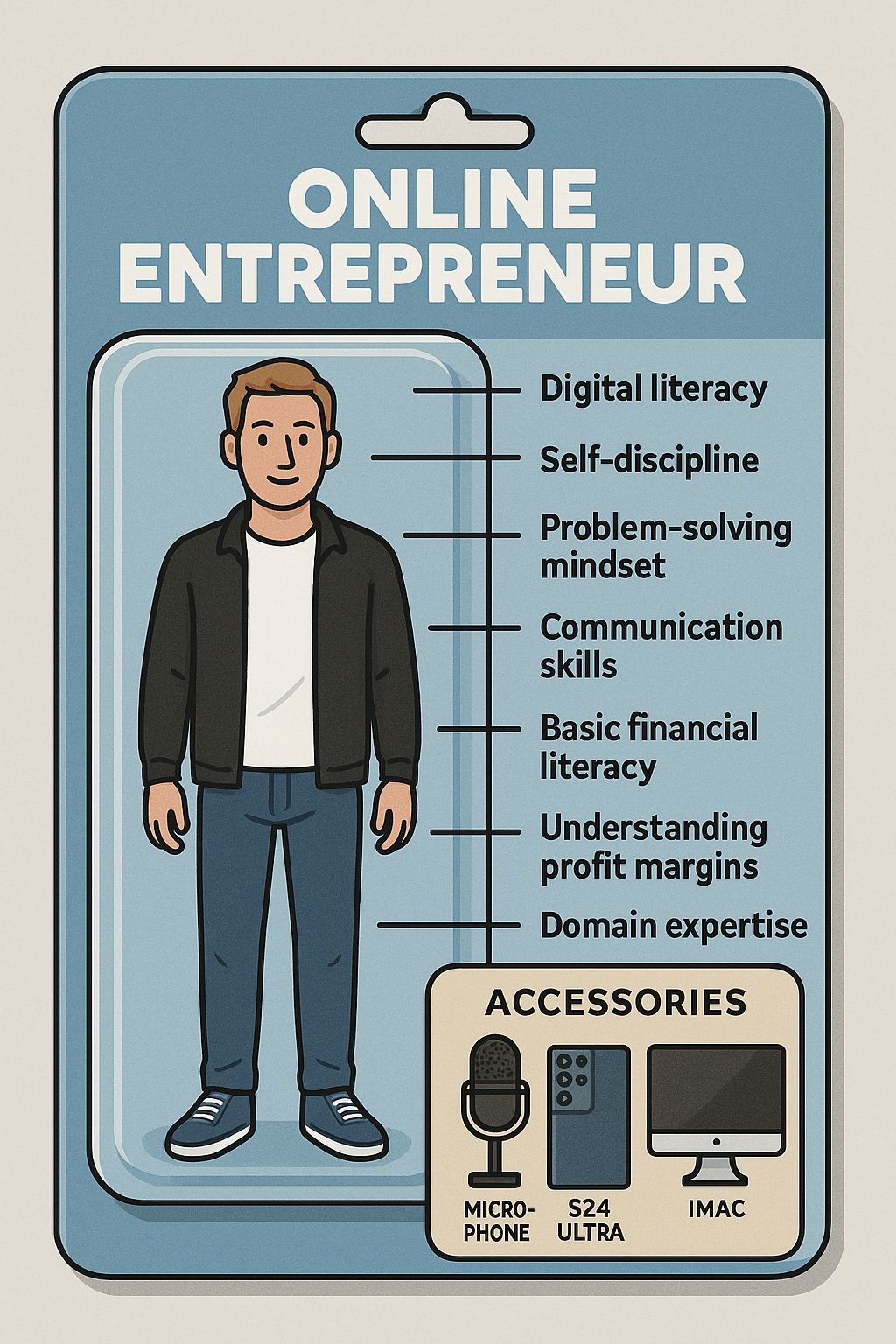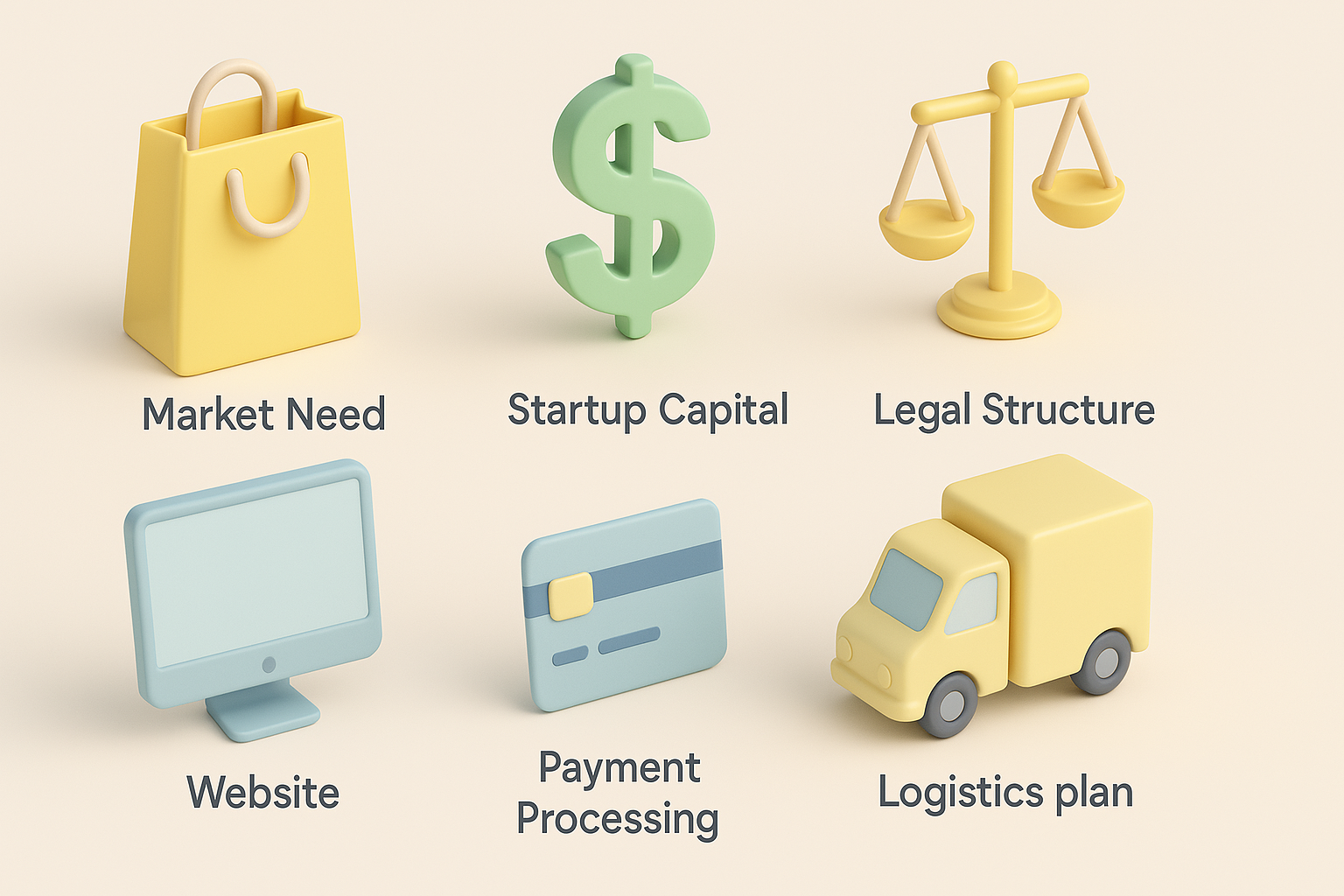Starting an online business is often portrayed as something anyone can do with minimal investment. While there’s truth to this, success depends on having the right combination of skills, knowledge, and resources. Let’s explore what it really takes.

The idea of starting an online business is more popular than ever. With low startup costs, flexible work options, and the potential for passive income, it’s easy to see why so many people are drawn to it. But while the internet has removed many of the traditional barriers to entrepreneurship, building a successful online business is not as simple as some make it seem.
Many aspiring entrepreneurs dive in with excitement, only to realize that success takes more than just a great idea. Challenges like attracting customers, managing operations, and staying competitive can quickly become overwhelming without the right approach.
This post breaks down what it really takes to start and grow an online business. Whether you’re beginning with limited resources, considering buying an existing business, or learning as you go, there’s a way forward. The key is understanding the different paths available and choosing the one that best fits your skills, budget, and long-term goals.
Starting an online business requires more than just a great idea—you need the right skills and mindset to make it work. If you have the following skills, you’ll have a solid foundation for success:
Running an online business means working with websites, e-commerce platforms, marketing tools, and automation software. Understanding how to use platforms like WordPress, Elementor Pro, or Shopify can make a big difference. If you’re not tech-savvy, consider investing time in learning basic web design, SEO, and analytics. Check out our website solutions to get a ready-to-go online presence.
Without a boss looking over your shoulder, staying focused is essential. Successful entrepreneurs set clear goals, maintain a structured schedule, and resist distractions. Tools like project management apps (Trello, Asana) and time-blocking methods can help you stay on track.
Challenges will come up—whether it’s troubleshooting website issues, handling customer complaints, or adjusting marketing strategies. Being resourceful and willing to learn will help you navigate these obstacles. Many online business owners learn from trial and error, online courses, and networking with other entrepreneurs.
Clear and engaging communication is key, whether you’re writing product descriptions, responding to customer inquiries, or crafting marketing messages. Effective writing and storytelling skills can significantly improve your brand’s visibility and customer trust. Consider learning basic copywriting and email marketing strategies.
Even if you’re not an accountant, you need to understand pricing, expenses, and profit margins. Familiarize yourself with tools like QuickBooks or Xero, and make sure you price your products or services competitively while maintaining profitability. Managing cash flow and tracking expenses will help keep your business sustainable.
Your knowledge in your chosen niche gives you an edge. Whether you’re selling digital products, offering a service, or running an e-commerce store, your expertise builds credibility and trust. If you’re still refining your business idea, start with a Basic4 website plan to establish your online presence while testing different business models. Explore your options.
Building an online business is a learning process, but having these skills will make the journey smoother and more rewarding.
Beyond personal qualities, successful online businesses typically require:
A product or service people actually want is the foundation of any business. Conduct market research, analyze competitors, and validate demand before launching. Tools like Google Trends, ChatGPT and customer surveys can help identify opportunities.
Even modest online businesses need some initial investment—for a website, marketing, software, or inventory. Budgeting properly and considering low-cost startup options like Basic4, Value7, or Pro8 website plans can help you start affordably.
Setting up a proper business structure, registering your business, obtaining necessary licenses, and complying with tax regulations are crucial. Consult local business authorities or a professional for guidance on legal requirements.
A well-designed website, active social media, and online marketing channels are essential for reaching customers. A professional website with SEO optimization and branding—like those offered in our website plans—can give you a strong start.
You need a reliable system to accept payments from customers. Payment gateways like Stripe, PayPal, or WooCommerce Payments enable secure transactions. Choose a solution that integrates seamlessly with your website.
If you’re selling physical products, you’ll need a shipping and fulfillment strategy. If you’re offering services, consider automation tools to streamline bookings and client interactions. Reliable delivery or service execution builds customer trust and retention.
Covering these elements will help you create a sustainable and scalable online business.

One of the main advantages of running an online business is the ability to reach a massive audience. However, to serve that audience smoothly, your website must be robust, fast, and hosted on reliable cloud infrastructure. A slow or unstable site can frustrate visitors and drive them away. Additionally, Google ranks websites based on performance, meaning that speed and uptime directly impact your search engine rankings. Using optimized hosting and a scalable web solution—like our Pro8 eCommerce website plan—ensures your business can handle growth efficiently.
Not everyone starts with all the skills, knowledge, or resources needed to build an online business. That doesn’t mean you can’t move forward. Here are three ways to get started even if you don’t have everything in place.
Purchasing an existing online business allows you to skip many of the early challenges:
Instant traffic – Established websites already have visitors, reducing the time needed to gain traction.
Proven business models – You inherit a system that’s already generating revenue.
Existing customer base – Instead of starting from zero, you gain access to an audience that trusts the brand.
Marketplaces like Flippa, Empire Flippers, and FE International connect buyers with online businesses for sale. Prices range from a few hundred dollars for small content sites to millions for profitable e-commerce stores and SaaS businesses.
Before purchasing, conduct thorough research:
Verify traffic and revenue sources – Ensure numbers aren’t inflated.
Understand why the business is being sold – Declining revenue or operational issues could be red flags.
Check website performance – Outdated platforms may require technical upgrades.
If you’re serious about buying, consider hiring a due diligence expert to avoid costly mistakes.
Instead of building a business from scratch, you can start on platforms that already have an audience:
E-commerce – Sell on Etsy, Amazon, or eBay without managing your own website.
Freelance services – Offer skills on Upwork, Fiverr, or TaskRabbit and get clients without marketing heavily.
Content creation – Monetize knowledge through YouTube, Substack, or Medium.
These platforms handle website hosting, payment processing, and customer trust, making it easier to focus on your products, services, or content. The trade-off is that fees can be high, and competition is strong. Eventually, you may want to transition to your own website for greater control—our website plans provide an all-in-one solution when you’re ready.
If your main challenge is a lack of skills, there are ways to build expertise while growing your business:
Take online courses – Platforms like Coursera and Udemy offer courses on marketing, web design, and e-commerce.
Find a mentor – Learn from someone experienced in your field. Online communities, LinkedIn, or industry groups can help you connect with the right people.
Partner up – If you’re great at sales but lack technical skills (or vice versa), team up with someone who complements your strengths.
Outsource strategically – Delegate technical tasks like web design or SEO while you focus on core business activities. For example, our website design services provide ready-to-use sites so you can launch without technical knowledge.
Many successful entrepreneurs started with gaps in their knowledge. The key is to take action, learn as you go, and build momentum.
The Perfect Website To Start A Business
1 Landing Page: A landing page with up to 10 sections, giving you plenty of space to express your idea or showcase your product or service. These sections are screen-sized divisions that display your content as visitors scroll down, one section after another.
3 Additional Pages: These include essential pages for your website: About Us, Cookies Policy, and Privacy Policy.
The plan comes with all the basic functional features you need to get started.
The features included in the base package is what you pay for at the beginning. Additional landing pages, pages, or new features are available in the website store at super affordable prices!
👉🏼 For the second and subsequent years, you pay only half the price of the
Basic4 Website Plan.
Starting an online business is often portrayed as an easy, risk-free path to financial freedom. While the barriers to entry are lower than in traditional businesses, the truth is that success still requires dedication, learning, and persistence. The idea that “anyone can do it” is misleading—it takes real effort to create a business that lasts.
Many new entrepreneurs underestimate the challenges of driving traffic, managing operations, and building a brand that people trust. The internet offers incredible opportunities, but it is also highly competitive. Those who succeed aren’t just lucky; they put in the work, adapt to challenges, and consistently refine their strategies.
Rather than aiming for perfection from day one, the best approach is to start small and grow steadily:
Test your idea with minimal investment – Start with a basic website or a marketplace to validate demand.
Continuously learn – Business trends, marketing strategies, and customer preferences change, so staying informed is key.
Adapt as you go – Flexibility is crucial. What works today might not work tomorrow, so be open to adjusting your strategy.
No matter your starting point, building an online business is possible—it just takes different paths depending on your skills, resources, and experience. Whether you begin by purchasing an existing business, leveraging third-party platforms, or learning as you go, the important thing is to take action and keep moving forward.
Your business won’t be built overnight, but with persistence and smart planning, you can create something sustainable and rewarding.
ai4k.eu © Copyright 2025 Designed in Norway
PRO8
4 Landpages and 7 pages.
Ecommerce.
VALUE7
3 Landpages and 4 pages.
Established Business.
BASIC4
1 Landpage and 3 pages.
Starting Business.
You can change currency if you are outside Norway